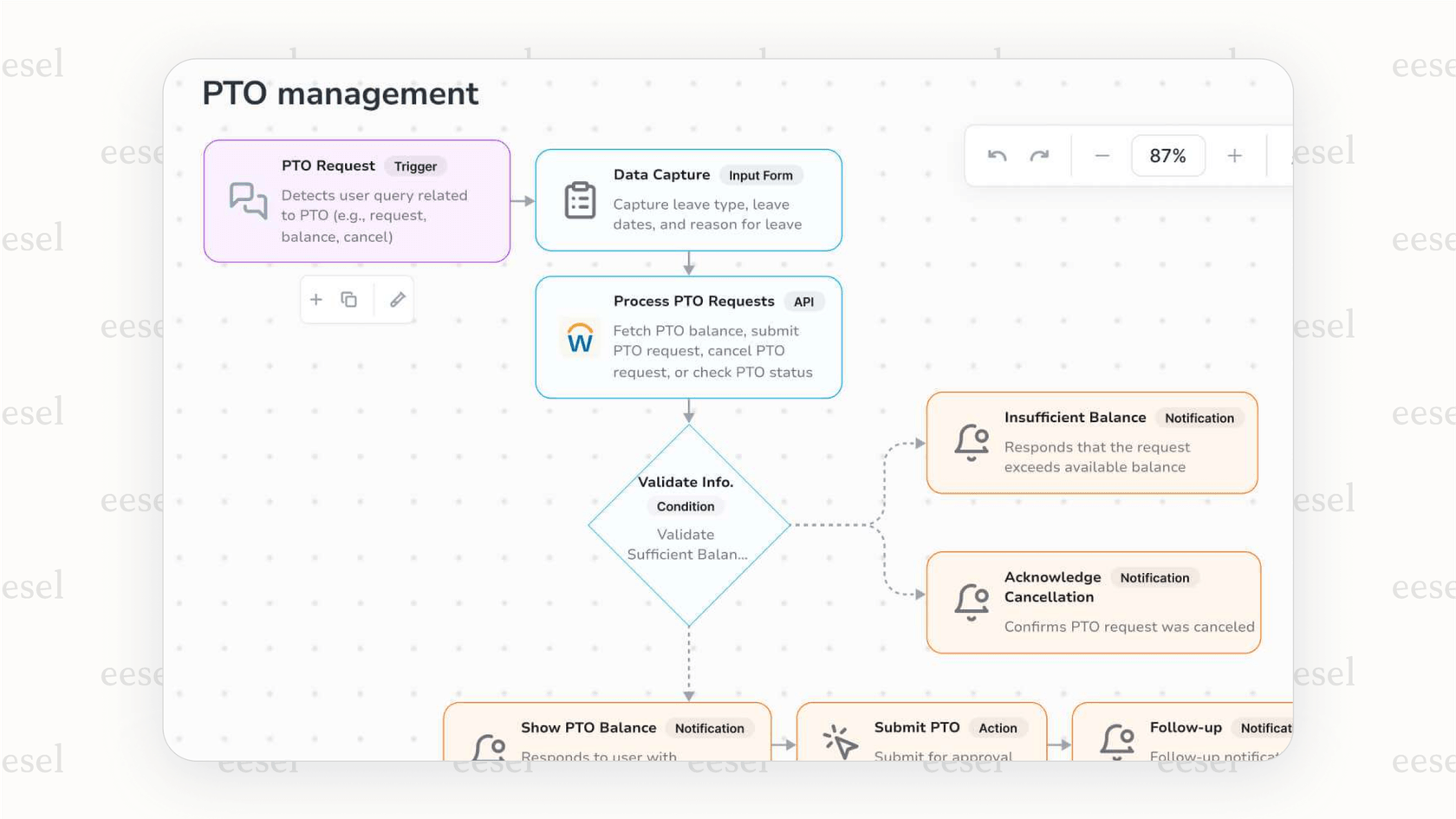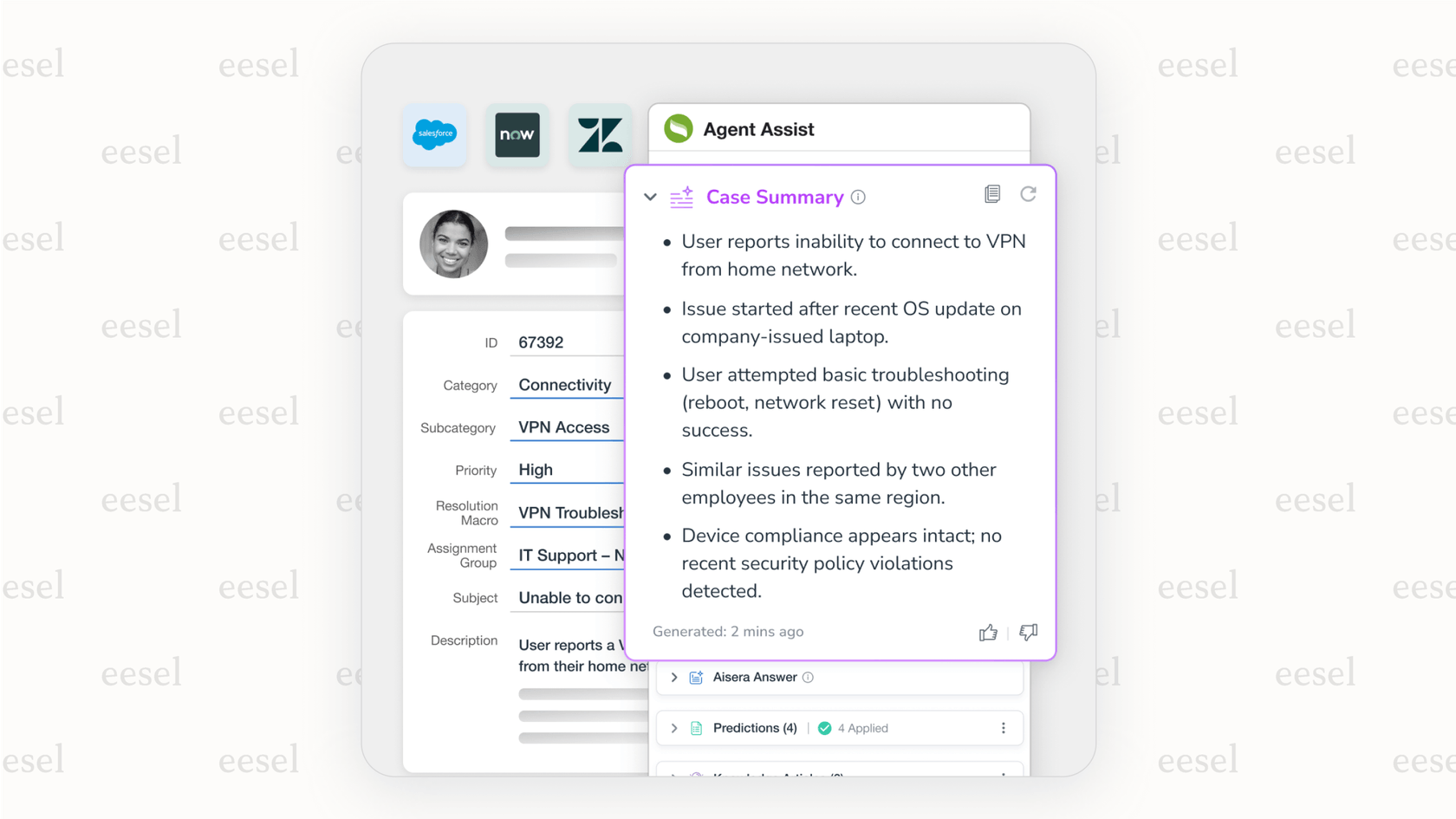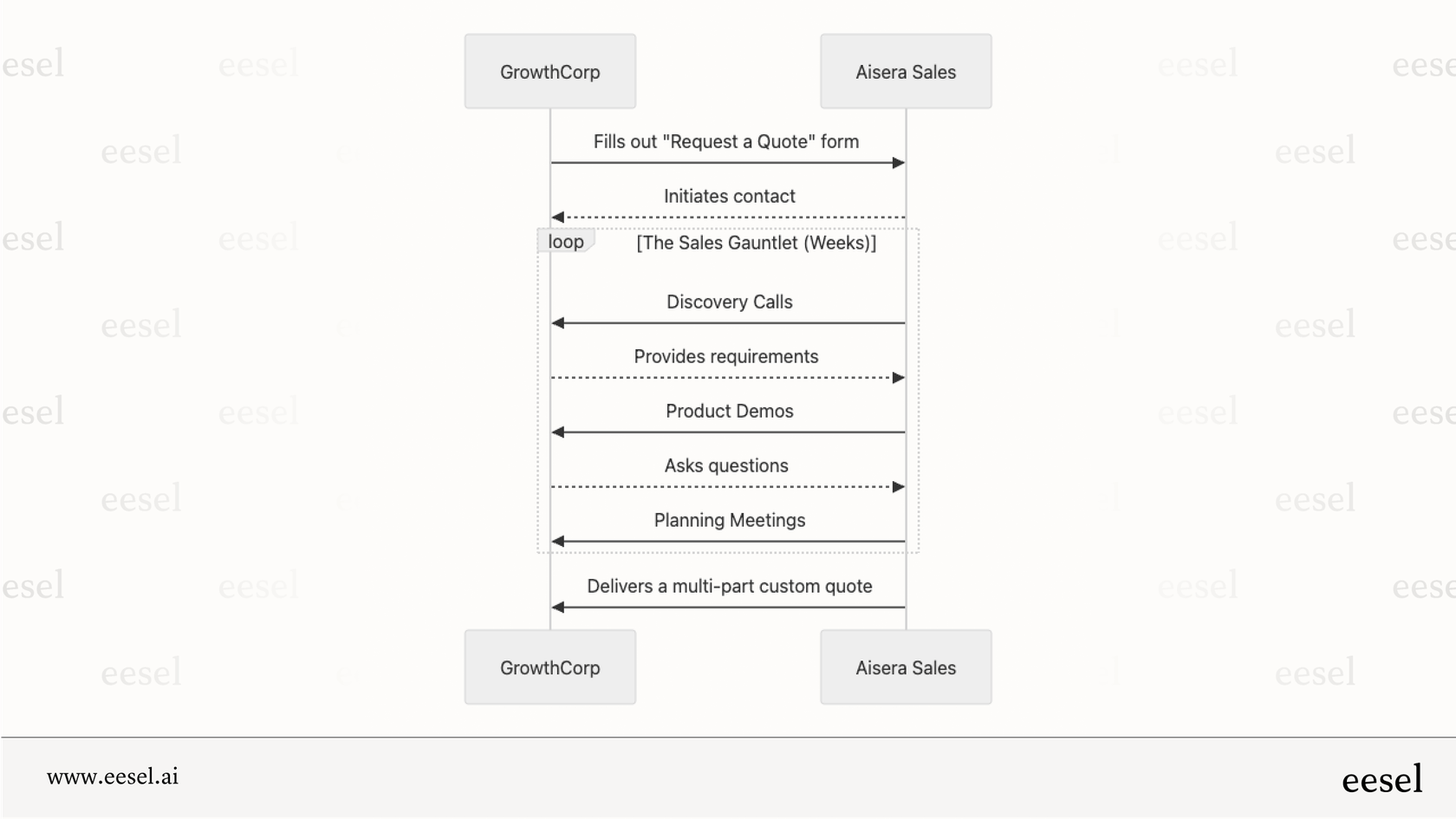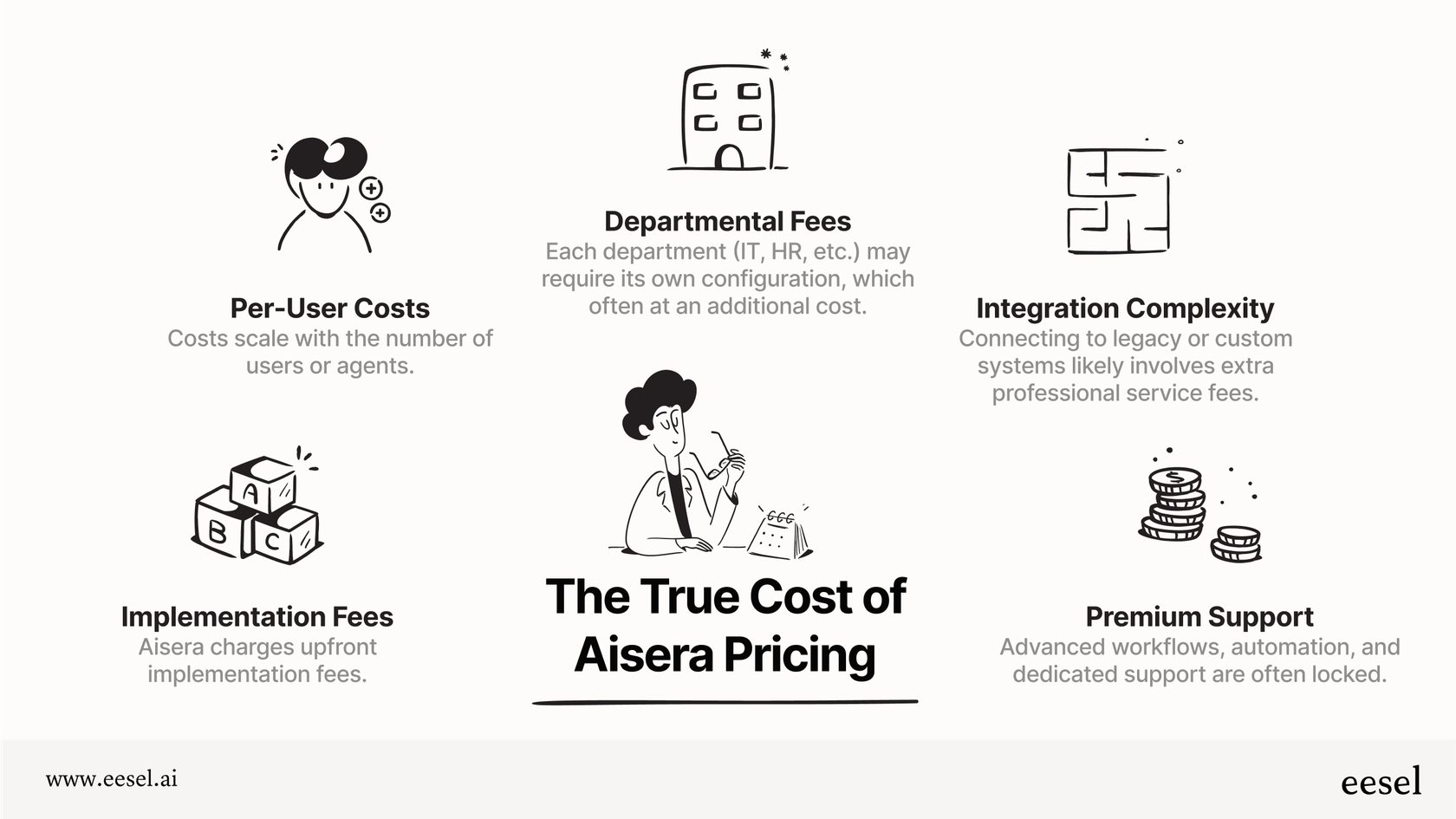
The world of enterprise support is swimming in AI right now, and it’s easy to see why. Teams in IT, HR, and customer service are all trying to figure out how to automate the repetitive stuff, solve problems faster, and give people the instant answers they’ve come to expect.
In this pretty crowded space, you’ve probably heard of Aisera. It’s positioned as a big player, a powerful AI agent platform that promises to automate almost any workflow you can imagine.
But what does that really mean for your team? This article is a straightforward, no-fluff look at what Aisera is, what it actually does, and who it’s built for. We’ll also get into some of the potential headaches, like its complex, enterprise-only sales process. And for those of you who don’t have six months to launch a new tool, we’ll explore a much more accessible alternative.
What is Aisera?
Aisera calls itself an "AI Service Experience Platform (AISX)." That’s a bit of a mouthful, so let’s translate. At its core, it’s a big suite of AI tools meant to automate support and other operational tasks across a company, whether that’s for IT, HR, Finance, or Customer Service.
The main idea they push is something called "Agentic AI." The goal here isn't just to have a chatbot spit out answers from a help article. It's about letting the AI take action and complete tasks with multiple steps, all on its own. Looking at their customer stories, which feature names like NJ Transit and BDO Canada, it's obvious they're targeting massive enterprises and government organizations.
Under the hood, Aisera uses a mix of generative AI and its own large language models (LLMs). It’s designed to plug into the tools that big companies run on, like ServiceNow, Workday, and Microsoft Teams. This enterprise focus has definitely gotten them noticed by industry analysts at Gartner and IDC, which helps cement their reputation in the AI automation game.
A deep dive into the platform's features
Aisera isn't just one thing; it's a whole platform made up of different parts that work together. Let's break down the main features they talk about.
The unified AI agent platform
Aisera’s setup is based on a system of multiple agents. There’s a universal agent that acts like a traffic cop, directing requests to the right place. Then there are domain-specific agents that get the nuances of IT versus HR, and task agents that actually connect to your other software to get things done.
The list of capabilities is long, covering everything from deflecting tickets and resolving them automatically to managing user permissions and even trying to predict IT incidents before they happen. But let's be real, a platform this complicated almost always comes with a massive learning curve. To get it working right, you’re likely going to lean heavily on their team for setup, tweaking, and keeping it running. This is the complete opposite of modern, self-serve tools that are built to get you value in hours, not quarters.

Domain and industry-specific solutions
Aisera has tailored solutions for different departments, like ITSM, HR, and Finance. They highlight specific use cases for each one, like automating the new-hire process for HR or handling invoices in Procurement.
These pre-packaged solutions sound great, but they can box you in. If your company's way of doing things doesn't line up perfectly with their pre-built models, you could end up with a rigid system that’s a pain to customize. This is where a more flexible tool can really shine. For instance, a solution like eesel AI focuses on unifying knowledge from all the places it already lives in your company, whether that's Google Docs, Confluence, or your past support conversations. Instead of forcing you into a vendor's box, it creates a single source of truth that learns from how your business actually operates.
Agent Assist and AIOps
For your human support agents, Aisera has an "Agent Assist" feature. The idea is that it works alongside them, pulling up relevant info, summarizing long ticket histories, and suggesting what to do next to solve problems faster.
They also offer an AIOps (AI for IT Operations) tool that’s all about monitoring your systems to catch problems early. The goal is to predict and fix IT issues before they turn into major outages. These are definitely powerful features for a large enterprise, but they also require a serious investment of time and money to get integrated and managed properly.

| Feature | Description | Primary Use Case |
|---|---|---|
| AI Agents | Autonomous agents that handle tasks and workflows from start to finish. | Deflecting common tickets, providing self-service resolutions. |
| Aisera Assistant | An embedded copilot for employees inside tools like MS Teams. | Answering internal questions, finding company knowledge. |
| Agent Assist | Real-time help and suggestions for human support agents. | Helping agents work faster and reducing resolution time. |
| AIOps | AI for IT Operations, with a focus on predicting incidents. | Minimizing system downtime and cutting operational costs. |
This demo shows how Aisera's Agentic AI can automate complex workflows across IT, HR, and customer experience.
Implementation and use cases: Who is it really for?
If you spend any time on Aisera's website, a very clear picture of their ideal customer emerges: a huge organization with complicated problems, a big IT team, and an even bigger budget. They talk about saving millions for companies like Lifescan and boosting productivity for workforces of thousands. This simply isn't a tool for a scrappy team that needs a solution by the end of the week.
The process of getting a platform like this up and running is typically a marathon, not a sprint. It usually goes something like this:
-
First, you have to get in touch with their sales team to book a demo.
-
Then you’ll go through a long discovery process where they dig into your workflows to put together a custom plan.
-
Next comes the annual (or multi-year) contract.
-
After that, a dedicated implementation project begins, which can easily take several weeks or even a few months.
-
And even after you go live, you’ll probably still rely on their professional services for setup, training, and ongoing help.

This hands-on, heavyweight approach is a major dividing line. While Aisera aims for the Fortune 500 crowd, other solutions like eesel AI are built for teams that need to be more agile. With eesel’s radically self-serve platform, you can connect your help desk, point the AI to your knowledge sources, and go live in minutes, not months, often without ever needing to speak to a salesperson.
Pricing: What to expect (and a more transparent alternative)
If you’re trying to find out how much Aisera costs, good luck. Their website doesn't have a pricing page; as of this writing, the link for it is actually broken. This "talk to sales" model is standard in the enterprise software world, and it usually means a few things for you, the buyer:
-
Custom Quotes: The price is different for everyone, based on your company size, how much you’ll use it, and which features you need.
-
Long-Term Contracts: You’ll almost certainly be signing up for at least a year.
-
Hidden Costs: Be prepared for potential add-on fees for implementation, training, priority support, or if you go over certain usage caps.
-
No Transparency: You can't just do a quick cost-benefit analysis. You have to jump into a full, and often slow, sales cycle just to get a number.
This lack of clarity can be a real dealbreaker for teams that want to move quickly and know exactly what they’re getting into.

A modern approach: Clear and predictable pricing with eesel AI
In a world of opaque enterprise contracts, eesel AI's pricing is designed to be refreshingly simple and predictable.
The difference in philosophy is huge. eesel AI’s plans are based on feature tiers and a generous bucket of monthly AI interactions, not how many tickets it resolves. This means you don’t get penalized with a bigger bill just because the AI had a great month and helped a lot of customers. You can also get started on a month-to-month plan and cancel whenever you want, a level of flexibility that is pretty much unheard of in the enterprise world Aisera operates in.
Here’s what their pricing looks like, right out in the open:
| Plan | Monthly (bill monthly) | Effective /mo Annual | Bots | AI Interactions/mo | Key Unlocks |
|---|---|---|---|---|---|
| Team | $299 | $239 | Up to 3 | Up to 1,000 | Train on website/docs; Copilot for help desk; Slack; reports. |
| Business | $799 | $639 | Unlimited | Up to 3,000 | Everything in Team + train on past tickets; MS Teams; AI Actions (triage/API calls); bulk simulation; EU data residency. |
| Custom | Contact Sales | Custom | Unlimited | Unlimited | Advanced actions; multi‑agent orchestration; custom integrations; custom data retention; advanced security / controls. |
This transparency isn’t just about pricing; it’s built into the product. Every eesel AI plan comes with a powerful simulation mode. This lets you test your AI on thousands of your actual past support tickets before you ever turn it on for customers. It lets you deploy with confidence because you already know exactly how it’s going to perform and what your resolution rate will be.
Is Aisera the right AI service platform?
At the end of the day, Aisera is a heavyweight, enterprise-grade AI platform. It’s built for massive companies that have the budget, the people, and the time to invest in a long, vendor-led implementation. For them, its deep feature set might be just what they need to tackle their complex internal processes.
However, for most teams, that model just doesn't work. The lack of public pricing, the long and drawn-out sales cycles, and the potentially rigid setup make it a tough sell for anyone who values speed, control, and transparency.
For those teams, a modern, agile alternative like eesel AI makes a lot more sense. It gives you a powerful AI agent that you can connect to the tools you already use, train on your own company knowledge, and get running in minutes. If you're ready for an AI platform you can actually set up yourself this afternoon, you can give eesel AI a try for free.
Frequently asked questions
Aisera is an "AI Service Experience Platform" designed to automate complex operational tasks across various departments. Its "Agentic AI" focuses on enabling the AI to take multi-step actions and complete workflows autonomously, rather than just providing information.
Aisera is primarily designed for large enterprises and government organizations. It caters to companies with extensive IT teams, large budgets, and complex internal processes that require deep integration and significant vendor support.
Implementing Aisera typically involves a lengthy process, starting with custom sales discussions and a discovery phase. A full implementation project can easily take several weeks to a few months, often requiring extensive support from their professional services team.
Aisera offers autonomous AI agents for ticket deflection and resolution, Agent Assist for human agents, and AIOps for predicting and preventing IT incidents. It also provides tailored solutions for departments like ITSM, HR, and Finance.
Aisera's pricing follows a custom quote model common for enterprise software, meaning it's not publicly disclosed. This implies potential buyers should expect custom pricing, long-term contracts, and possible hidden costs for implementation and support.
Key challenges include a complex platform with a steep learning curve, a lengthy implementation process, and a lack of pricing transparency. The rigid nature of pre-built solutions might also limit customization if your workflows don't align perfectly.
Share this post

Article by
Kenneth Pangan
Writer and marketer for over ten years, Kenneth Pangan splits his time between history, politics, and art with plenty of interruptions from his dogs demanding attention.







